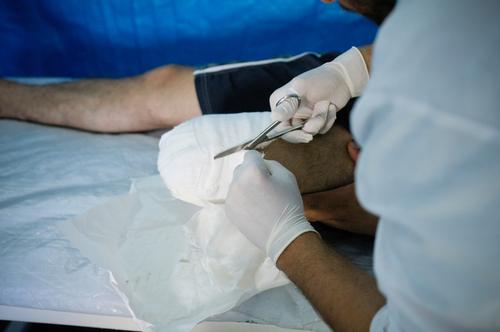AA and AK are two paramedics from the besieged East Ghouta suburban area near Damascus. Working with hospitals that MSF provides regular support to, they describe their struggle to respond after the bombing of a public square on January 23, 2015.
AA: Around half an hour after we left the mosque, fighter-jets started bombing the town square. We received a call from the emergency unit and we were instructed to head to the raid area to evacuate the victims. The town square is at a crossroads and hosts a popular market where street vendors sell their products.
I was shocked when I arrived. The place was hardly recognizable, due to the extent of destruction. Dozens of people, dead and wounded, were scattered all over the place, children, men, women, old people.
AK: A thick cloud of dust covered the place. You could only see a few meters ahead, making it very difficult to locate the victims. The bombs brought entire buildings to the ground, with residents inside. There was indescribable, horrifying destruction. Immediately, we started evacuating as many victims as we could, driving them to hospitals in the region.
AA: Immediately after the first trip, we rushed back to the raid area to evacuate more victims. There was a second raid. Bombs fell from everywhere. An ambulance was hit and I was wounded in the head, but my injury was superficial.
AK: I was also hit in the arm. Thankfully, my injury was superficial too. It is not uncommon for there to be a second wave of bombing after a bombing raid. We paramedics, every time we are dispatched to evacuate victims, we never discount the possibility that we could become one of the statistics. We had already been bombed before, while evacuating wounded people. One of my colleagues was seriously injured in that bombing. He lost an arm. He is still alive, but he can’t work anymore.
AA: We were feeling fear and anxiety, but we started rescuing victims and evacuating the wounded towards hospitals. The rescue operations are made harder by technical obstacles and lack of resources. Fuel is scarce and we have no personal protection gear, such as helmets. Our work is almost a mission impossible. Our attempts to respond to these needs fail most of the time.
AK: Exactly. Our ambulances are just regular vehicles which have been transformed to fit two wounded people in the rear part of the cabin. On that Friday, we had to evacuate eight or nine people every time. And there were other difficulties too - the vehicles are not equipped to be driven in devastated areas and the tires frequently get punctured by the debris, making the operation harder and forcing crews to stop and change tires.
We are somehow getting used to regular bombings, but there sometimes you are confronted with a scene that you just cannot cope with. I can never forget those tiny body parts that probably belonged to a little boy, full of life. This is of the sort of thing we see almost every day. We forget some images, but others refuse to fade away.
What we see here and what is happening here is a tragedy. The risks we take are scary. We knew from day one that anything was possible as far as our destiny was concerned. We made up our mind and accepted the job, as a humanitarian mission and being aware that if we stopped doing what we are doing, the humanitarian situation will worsen. We don’t know what is in store for us, but we know that our lives are at stake, today more than ever. We try to be cautious as much as possible, but in reality we share the same general danger as everyone living here under the bombs. Our fate is dictated by the siege we are living, but it only makes us more determined to do our job, hoping that we can help alleviate this ordeal.
During the last four months, MSF teams outside of Syria have been in contact, on a daily or weekly basis, with medical staff from hospitals and paramedical staff supported by the organization in besieged East Ghouta, as the bombing has intensified, and with it the needs the medical staff is striving to respond to.
Through its emergency medical support program, covering 100 hospitals and medical points in Syrian, mainly inthe besieged areas, MSF is providing these facilities with supplies to maintain a stable healthcare offer to victims. However, repeated raids cause mass injuries and a supply shortage that is hard to make up for despite all attempts.



